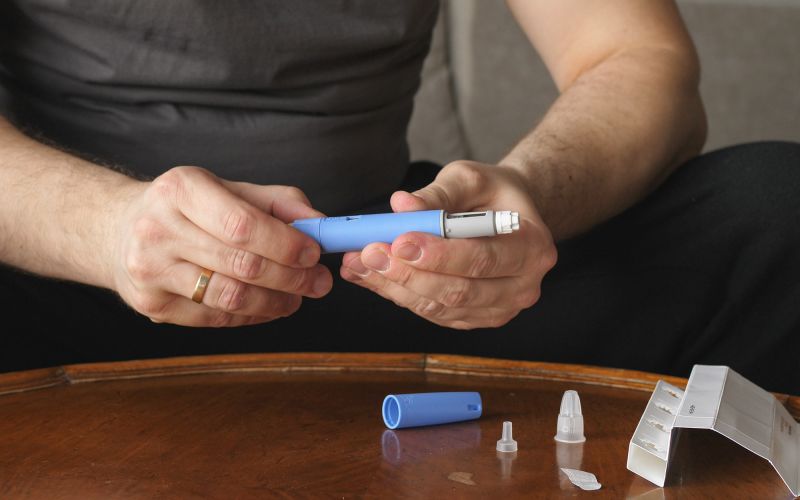Editor’s Note: If you or someone you know is struggling with suicidal thoughts or mental health matters, please call the 988 Suicide & Crisis Lifeline by dialing 988 to connect with a trained counselor, or visit the 988 Lifeline website.
People taking semaglutide, the popular medication for diabetes and weight loss, are more likely to report having thoughts of suicide compared with those taking other drugs, according to a new study of an international drug safety database. But the finding is the latest see-saw of scientific evidence on the risk of depression and suicide tied to the popular medications — and critics say evidence that the drugs cause problems with mood is limited.
Semaglutide is sold under the brand name Ozempic when it’s prescribed for diabetes and Wegovy when it’s prescribed for weight loss. In addition, a number of companies make compounded forms of the drug. The use of the medication has surged in recent years, and studies have shown more promising effects, including reductions in kidney disease and cancer.
But suicide has been a long-standing concern with medications that alter the desire for food. For some people, losing the pleasure and reward of eating — and perhaps other things — creates a dramatic shift in mood and may increase the risk of self-harm. In 2008, the weight loss drug rimonabant, which acted on the same brain system that gives people the munchies when they’re on marijuana, was withdrawn from use because it increased the risk of suicide. (The drug was never approved for use in the United States.)
The patient information for semaglutide already includes a warning to watch out for depression and suicidal thoughts. But there’s been conflicting evidence about the risk of suicidal thoughts and feelings with new weight loss drugs, including semaglutide.
Earlier this year, the European Medicines Agency said available evidence did not show a link between suicide and semaglutide and other drugs used for weight loss. The US Food and Drug Administration has also been investigating the risk of suicide and suicidal thoughts across drugs in the same class as semaglutide and thus far has not found any increased risk. However, the agency says it can’t rule out a small increase in risk because of the small total number of events in their surveillance systems, and its investigation is ongoing.
A large study published in January in the journal Nature Medicine found that use of semaglutide was linked to a lower risk of suicidal thoughts, compared with people taking different kinds of medications for weight loss and diabetes.
The new study, which was published Tuesday in the journal JAMA Network Open, looked at reports of suicidal thoughts in people taking semaglutide — whether for diabetes or weight loss — in a database maintained by the World Health Organization that compiles adverse events linked to drugs across 140 countries.
The study authors found 107 reports of patients, out of more than 30,500 total, who said they thought about killing themselves while taking semaglutide and 162 similar reports, out of more than 52,000, in patients taking liraglutide, a different injected diabetes medication that’s in the same class as semaglutide. Liraglutide is an older drug, so more people have had experience taking it.
The study authors found what they describe as a disproportional risk of suicidal thoughts in people taking semaglutide but not in people who were taking liraglutide. When they compared reports of suicidal thoughts in people taking semaglutide with the risk reported with all other drugs in the database, they found that the risk was elevated by about 45% in people taking semaglutide.
The risk was about four times higher in people who were also taking drugs to control depression and anxiety, suggesting that this group may be at even higher risk for mood effects with these medications. When the study authors excluded cases of people taking semaglutide and antidepressants, the association disappeared — suggesting that people who were taking both drugs were driving the risk.
The study authors acknowledge that their research has limitations. But because so many people are taking semaglutide, they think the findings warrant further study and “urgent clarification” about the risk.
Other experts said the evidence presented in the study is thin.
“Basically, it is hard to tease out from this study whether it is the drug doing this or the mood disorder,” said Dr. Mahyar Etminan, an expert in drug safety at the University of British Columbia in Vancouver who was not involved in the study
- Sign up here to get The Results Are In with Dr. Sanjay Gupta every Tuesday from the CNN Health team.
“This paper presents, at best, weak evidence of an association between semaglutide and suicidality,” said Ian Douglas, a professor of pharmacoepidemiology at the London School of Hygiene & Tropical Medicine. In a comment given to reporters, Douglas says studies like this are good for generating theories but can’t prove cause and effect.
In a commentary on the study, Dr. Francesco Salvo and Dr. Jean-Luc Faillie, two French drug safety researchers who were not involved in the research, agree. They say it’s common for drug safety studies to vary in their conclusions depending on the database that’s used and the methods of the study. Until we have better evidence, it’s a good idea to be careful, they say.
“Depression or suicidality are rare but extremely severe events and need to be prevented and managed as much as possible,” Salvo and Faillie wrote.
Without more precise data, they think GLP-1 and other kinds of appetite suppressants should be prescribed with caution in people with a history of depression or suicidal thoughts. And if patients experience a new episode of depression while on the medication, they wrote, doctors may want to consider “immediate discontinuation.”







